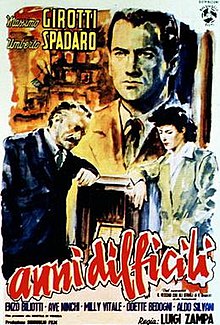
Mario Rutelli was an Italian sculptor.

Angelo tra la folla is a 1950 Italian film directed by Leonardo de Mitri.

Appointment for Murder is a 1951 Italian crime melodrama film drama directed by Baccio Bandini.
Invisible Chains is a 1942 Italian drama film directed by Mario Mattoli and starring Alida Valli, Carlo Ninchi and Giuditta Rissone. It was shot at the Cinecittà Studios in Rome. The film's sets were designed by the art directors Ottavio Scotti and Mario Rappini.
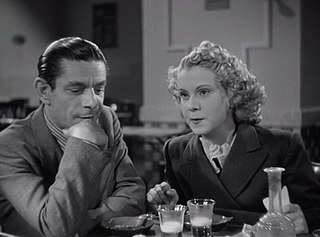
Lively Teresa is a 1943 Italian comedy film directed by Mario Mattoli and starring Lilia Silvi, Roberto Villa and Carlo Ninchi. It was produced in the style of the White Telephone comedies popular during the Fascist era.
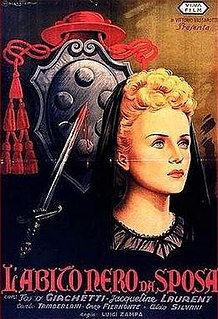
L'abito nero da sposa is a 1945 Italian historical drama film directed by Luigi Zampa and starring Fosco Giachetti. It is based on the play The Cardinal by Louis N. Parker.

Cameriera bella presenza offresi... (Housemaid) is a 1951 Italian film directed by Giorgio Pastina. Federico Fellini was one of its scriptwriters. The film marked the comeback of Elsa Merlini after a nine years hiatus.

Un giorno nella vita is a 1946 Italian war film directed by Alessandro Blasetti. It was entered into the 1946 Cannes Film Festival. American title: "A Day In the Life". This film was screened in 2009 at the Film Society of Lincoln Center's retrospective "Life Lessons" Italian Neorealism and the birth of modern cinema.

Mussolini and I is a 1985 made-for-television docudrama film directed by Alberto Negrin. It chronicles the strained relationship between Italy's fascist dictator Benito Mussolini and his son-in-law and foreign minister, Count Galeazzo Ciano, based on Ciano's diaries. Made in English as an Italian-French-German-Swiss-Spanish-US co-production, with Bob Hoskins, Anthony Hopkins and Susan Sarandon in the leading roles, it first aired on Rai Uno on 15 April 1985 in a 130-minute version. On 8 September 1985, it premiered in the USA on HBO in an extended four-hour version.
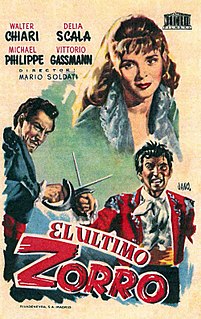
The Dream of Zorro is a 1952 Italian comedy adventure film directed by Mario Soldati and starring Walter Chiari, Delia Scala and Vittorio Gassman. The future star Sophia Loren had a minor role in the film.
The Gates of Heaven is a 1945 Italian drama film directed by Vittorio De Sica.
Dora Nelson is a 1939 Italian comedy film directed by Mario Soldati and starring Assia Noris, Carlo Ninchi and Luigi Cimara. It is a remake of the 1935 French film of the same title, which was based on a play by Louis Verneuil. The film was shot at Cinecittà in Rome, with several real employees of the studio appearing as themselves.

A Husband for Anna is a 1953 Italian romance-drama film directed by Giuseppe De Santis.
Magic Village is a 1955 French-Italian comedy film directed by Jean-Paul Le Chanois and starring Robert Lamoureux, Lucia Bosè and Hélène Rémy. Robert, a Parisian, is planning a holiday in Sicily with his new fiancée. However his work means he has to follow on a later train than his fiancée. While travelling he meets Lucienne an attractive Sicilian girl.

Romulus and the Sabines is a 1945 Italian comedy film directed by Mario Bonnard and starring Totò, Carlo Campanini, and Clelia Matania. It was one of several of Totò's postwar comedies to use elements of neorealism.

Two Hearts Among the Beasts is a 1943 Italian comedy film directed by Giorgio Simonelli and starring Totò, Vera Carmi and Enrico Glori. A dancing master takes part in an expedition to Africa find a missing anthropologist whose daughter he is in love with.
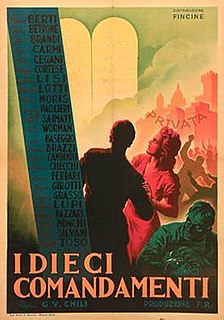
The Ten Commandments is a 1945 Italian drama film directed by Giorgio Walter Chili. It features an ensemble of Italian actors in episodes based on the Ten Commandments.
Events during the year 1928 in Italy.
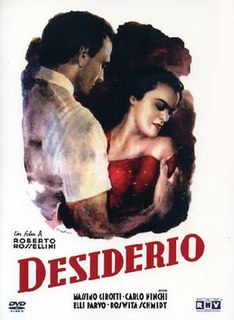
Desire is a 1946 Italian drama film directed by Marcello Pagliero and Roberto Rossellini and starring Massimo Girotti, Elli Parvo and Carlo Ninchi. Interiors were shot at the Farnesina Studios in Rome while location shooting took place around Tagliacozzo in L'Aquila. The film's sets were designed by the art director Virgilio Marchi.
